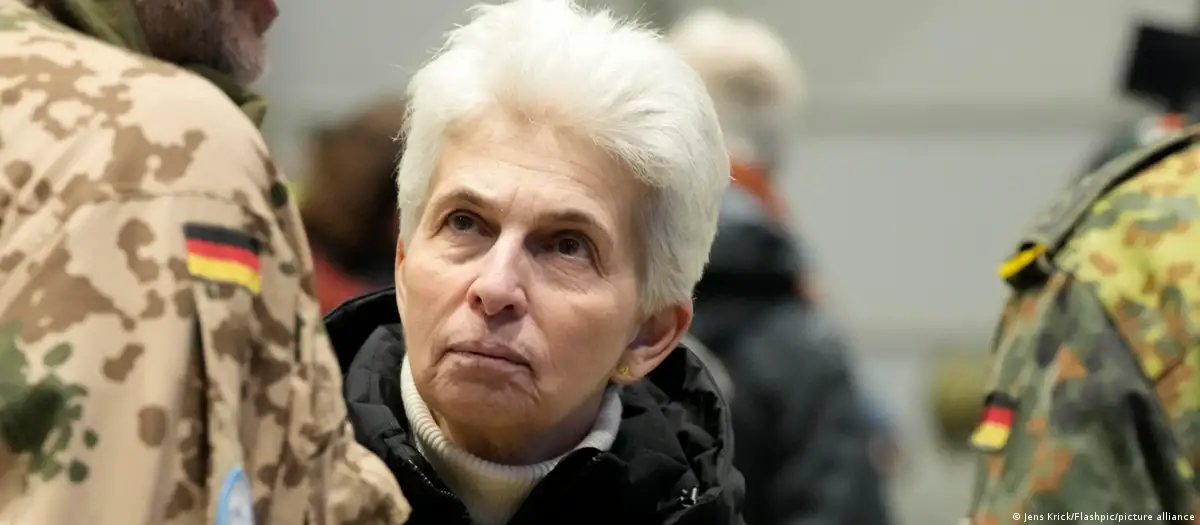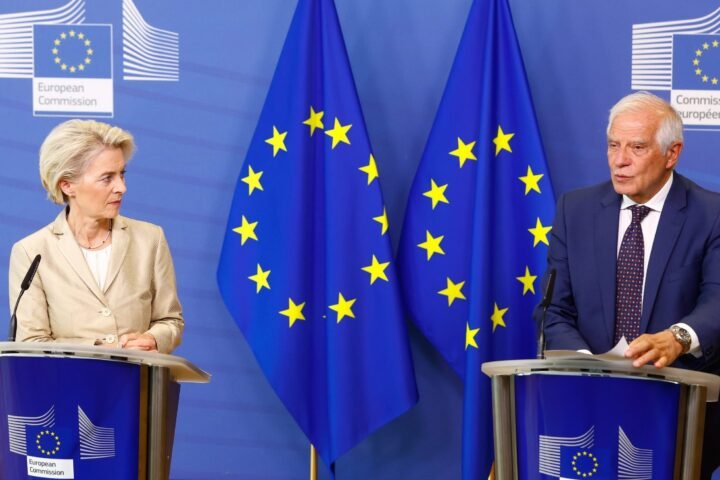As chair of the defense committee, Marie-Agnes Strack-Zimmermann is one of Germany’s most recognized supporters of Ukraine and of bolstering Germany’s own military. Now she hopes to bring her views to Brussels.
You know campaign season in the European Union is kicking into higher gear when major national figures start making supranational moves.
Marie-Agnes Strack-Zimmermann, who has argued for more aggressive support for Ukraine than the chancellor she works under, is set to run as the “Spitzenkandidat” (“lead candidate”) for the pan-European liberal party in European parliamentary elections in June.
Thirteen members of the Alliance of Liberals and Democrats for Europe (ALDE), to which Strack-Zimmermann’s German Free Democratic Party (FDP) belongs, confirmed their support this week.
“ALDE Party believes that Marie-Agnes has a strong and suitable profile that is needed to convey our liberal message in the European campaign,” the group said in a statement. The pick “reinforces our liberal commitment to the safety of our continent and to support Ukraine at any cost,” it added.
Strack-Zimmermann already topped the FDP’s list for running under the ALDE umbrella for European elections, which take place in early June.
Seeking political refuge in Brussels
The European Parliament’s political groups are organized by political affiliation, rather than nationality.
The European People’s Party of European Commission President Ursula von der Leyen is expected to once again emerge the strongest from the election, which is held every five years. The liberal Renew Europe group, with which ALDE is largely aligned, is in third and could drop to fourth or fifth in the next parliament.
The projected loss of seats is still better than the electoral prospects of Strack-Zimmermann’s FDP back in Germany. The party is already the smallest in the three-party federal governing coalition, and opinion polls show the liberals flirting with the 5% hurdle required to hold seats in Germany’s parliament, the Bundestag, at all.
With Strack-Zimmermann’s star rising as her party’s falls, it could be an opportune time to flee national politics by seeking refuge at the European level. It wouldn’t be an uncommon move. Germany’s Martin Schulz and Katarina Barley, both well-known Social Democrats, are recent examples of national figures who have oscillated between Berlin and Brussels.
Strack-Zimmermann has made a name for herself as the chair of the Bundestag’s defense committee. A regular visitor to Kyiv, within German politics she is one of the loudest advocates for Ukraine’s defense against Russia’s full-scale invasion. That has made her a fierce critic of the government to which she and her party belong.
A hawk among chickens
In several instances, most recently on the matter of Taurus cruise missiles, Chancellor Olaf Scholz has blocked a more aggressive supply of weapons.
“For God’s sake, what is the chancellor waiting for?” Strack-Zimmermann tweeted in September. “He alone is blocking this decision within the coalition. It is irresponsible.”
All these months later, Scholz has not budged on the issue. If anything, he has dug in his heels against rising criticism that he is too scared of Russia. Strack-Zimmermann, by contrast, has appeared unapologetically hawkish.
“Ukraine needs Europe, and Europe needs Ukraine so that we can continue to live in peace and freedom in the future,” she told a friendly audience of fellow FDP members at a party congress in January.
While Strack-Zimmermann has said she is open to some kind of settlement in the conflict, she also said that “diplomacy will only be successful from a position of strength. Submission is not peace.”
Thinking differently on defense
Strack-Zimmermann’s presence in Brussels would dovetail with a renewed sense of urgency about common European defense. Earlier this month, the European Commission published its first-ever European Defense Industrial Strategy, which aims to boost and underwrite common defense production and procurement. The bloc has struggled on this front, most notably failing to deliver Ukraine a promised 1 million artillery shells, with some of its members putting national economic interests above defense commitments.
The strategy document is one step in a longer-term goal of making the European Union for self-sufficient in self-defense. Strack-Zimmermann has gone as far as to float working toward an EU army, something some of her fellow European hawks have warned could undermine NATO as the alliance of choice. So far, the European Commission has only spoken of better coordination among the EU’s 27 militaries, not supplanting them with an overarching force.
The risk a second Donald Trump presidency poses to the trans-Atlantic alliance is the other point putting pressure on the future of EU defense policy. Trump has threatened to back off supporting both Ukraine and US NATO allies if re-elected in November.
Strack-Zimmermann has called the constant hand-wringing “problematic,” and should instead be a call to action. Given Germany’s standing as Europe’s largest economy and one of the world’s biggest, she has wanted Germany to “do even more for Ukraine.”
That is a message she is likely to take to Brussels, as she pivots from the national legislature to the supranational one.
Source: Dw








